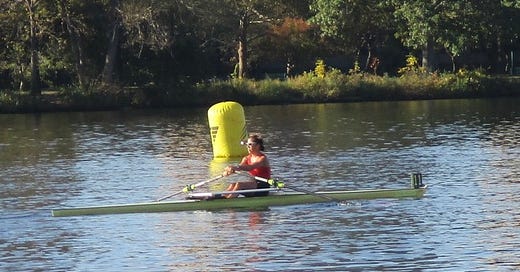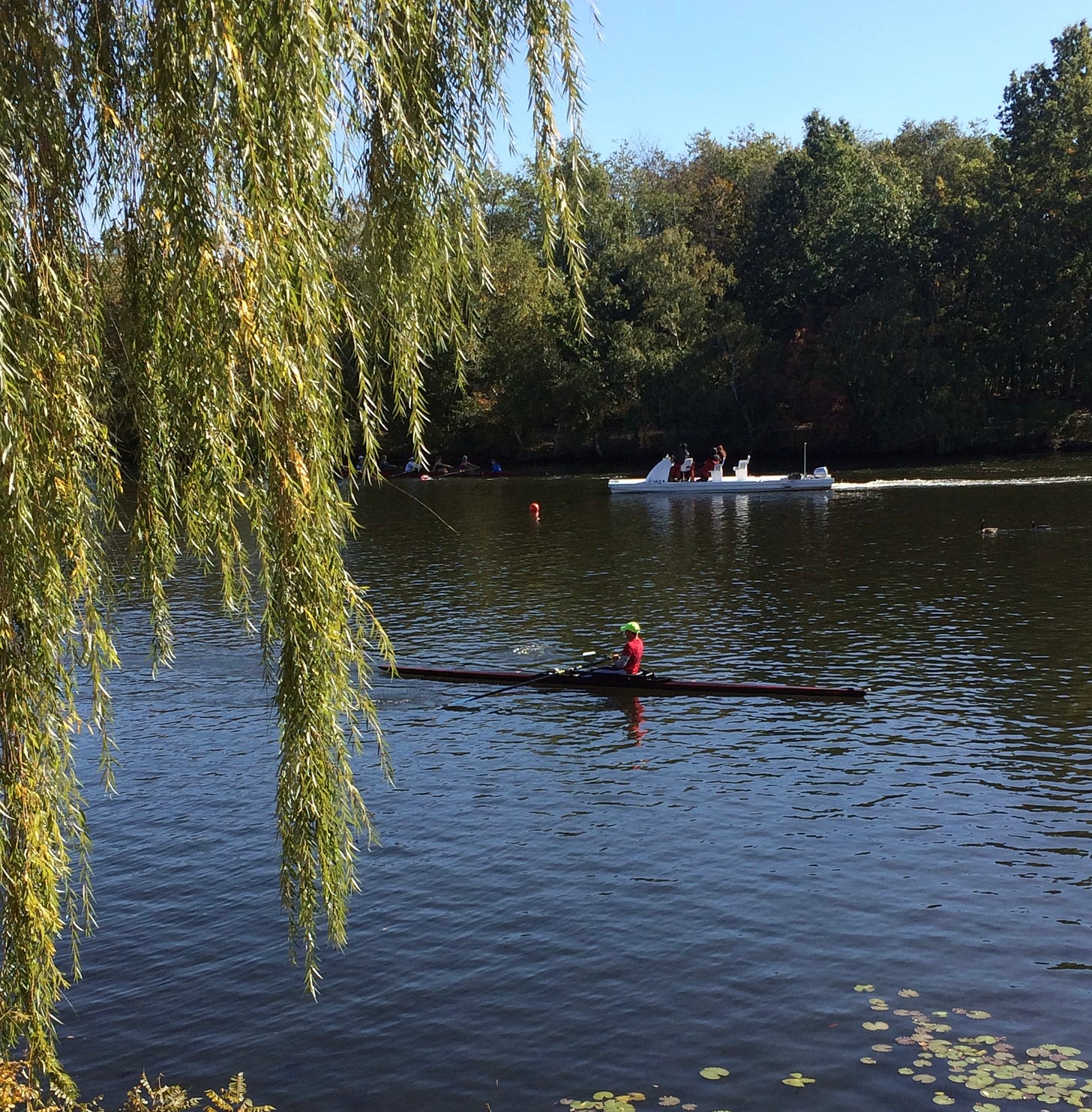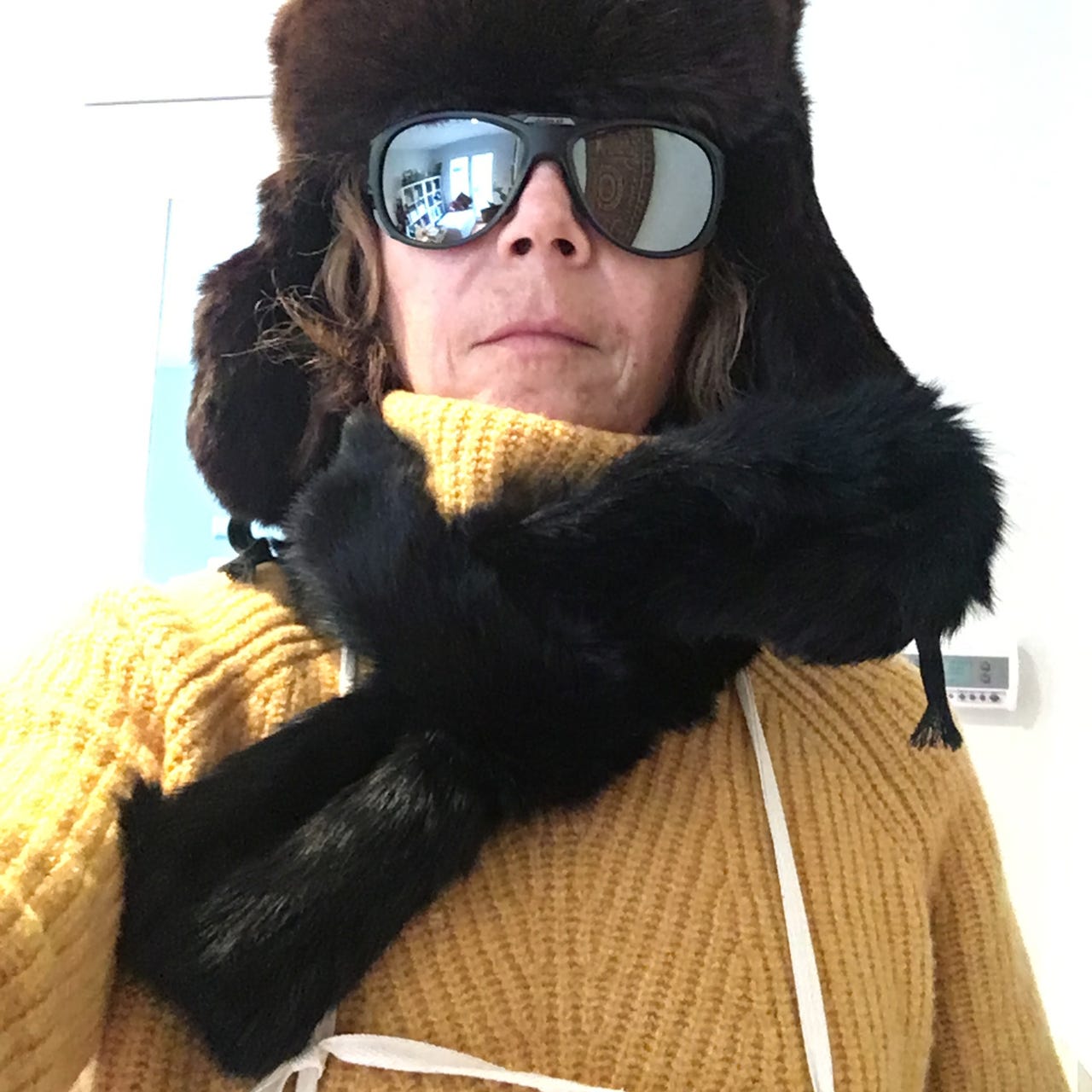It’s rowing season for me now, and that means reckoning with the fear of water. Wide water, to be precise. Apparently, I’m not alone among rowers in feeling uneasy if I’m rowing on a wide body of water. I’ve heard it called feeling sketchy. I like to call it I’m about to have a panic attack. As someone who experiences shades of this from time to time, I’m definitely bothered by it, but I’m also intrigued by the phenomenon. What is it about specifically wide water that can make me and quite a few stalwart and accomplished rowers I know feel exceedingly nervous, to the point of not being able to move the boat well?
I’m asking the question with rowing specifically in mind. The questions pertain, though, to any endeavor that you know you can master physically but that threatens to become impossible mentally.
First, a description of the sort of boat we rowers move around in. A single shell is barely wider than the sculler’s hips, and it will roll from side to side easily if you’re imbalanced. It will roll you right into the water if you fail to keep the balance set. Even an eight (with eight rowers and a coxswain steering) can tip its crew into the water if something untoward occurs. In a single, a wake can make you feel tippy, or chop in the river, or gusts of wind. You need to keep your cool to keep your balance. [Let me pause here to say that it can be incredibly dangerous if you fall in and become hypothermic. There is rational reason for fear, along with any irrational sources.]
Second, the river. The Charles River that runs through Cambridge and Boston and many other Boston-area towns is comparatively shallow and narrow. It has a current in the spring, but it has none of the tricks of tide and eddy that other famous rowing rivers possess. For instance, from what I have heard of rowing on the Thames as it runs through London—and what I have looked down on in horror with my own eyes from the Embankment or any of London’s bridges—the river can be a roiling monster. The equally-roiling Hudson has the added terror-inducing quality of being over half a mile wide. The Charles is tame by comparison. While the Charles River Basin by the Massachusetts Avenue bridge reaches four tenths of a mile wide, the most-rowed miles of the river are much narrower, sometimes barely allowing room beyond what’s needed for two lanes of boat traffic. It is possible, in other words, to be a rower on the Charles River and stay away from wide water.
But put together the wide Basin and the skinny single shell and there is high potential for feeling sketchy.
What is it about the width that can cause such fear? For most of the people I know who share this, um, reaction, we know how to swim, and we know how to get back into our boats if we do flip into the water. I often remind myself that, if really necessary, I could probably swim to shore alongside my boat and then stand up. I confess to have occasionally wondered, in the direst of dire weathers and straits, how far I could walk in my socks with the boat on my head if I had to get out of the river and go home. (The shoes are part of the boat, and we carry the boats on our heads.) If I were so terrified that I could not row, could I at least get myself to shore and then get the boat out of the water and then walk one mile to the first boathouse that might take me in? Any rower reading now will understand that this is extreme thinking. Maybe it’s the opposite of magical thinking, sort of a game plan for how bad can it get.
But let’s go back to the fear that leads to this wild game-planning. I have decided that the fear comes from a problem of scale. On a narrow river, it’s easy to feel like you are part of the shore. The shore is at your level, easy to reach. You’re cozy. The narrowness creates the perception (correct or not) of shallowness. Width creates the perception (again, correct or not) of depth. On wide water, my little boat with just me in it feels tiny. The shore is so far away. If I go into the river, my little head above the water will be a tiny, tiny speck in all that dark flat expanse of water. The water will become a kind of floor and I will be beneath it. I will be so small by comparison to the water that the water will somehow enact a downward pull on me. It will swallow me up. You begin to see how this goes, yes?
Let’s not even talk about wide water whose banks are steep. Ha Long Bay in Vietnam? The stuff of nightmares, right there. Never mind that it’s a destination renowned for its beauty where people go on relaxing cruises. For me, it would be terror the whole time. How on earth does a small craft on wide water and surrounded by steep high cliffs even make sense?
Two weeks ago, I went out for a row in a double (a two-person, four-oared sculling boat) before the sun was even thinking of coming up. It was my first row of the season. On a calm sunny day, the first row of the season is always going to be a bit tentative, as your body remembers what it feels like to, say, simply raise your right hand a little and have the boat roll down to the left. In the dark, on dark water, the whole thing is terrifying. Well, it was, for me. Even narrow water seems wide in the dark, partaking of the general blackness of the night.
Reader, I panicked.
I could barely move for the first ten minutes, every oar stroke an exercise in loyalty (don’t let your partner down), mixed with fear (we are going to go into the blackness), and force of will. It took everything I had in me not to just quit rowing and have Susan do all the work to just get me home, please.
I am learning, though, how to deal with this. I know that if I breathe deeply, it’s better. I know that if I keep moving, it’s easier. What I don’t remind myself of is the rational stuff—the fact that I’m unlikely to flip, or that I can swim fine, or that the river is not going to suck me down. This isn’t about reason. There is no point to reckoning with the truths and realities of the situation. There’s nothing, after all, that I can do to alter or improve the ratio between the size of my boat and the size of the water. The proportions will always be off.
Here is my question for you. What terrifies or has terrified you like this? Am I alone? (I don’t think so.) How do you deal with so powerful an irrational fear, a fear you must encounter on a regular basis to do the thing you love? Please do share your experience!









We sail about 6mos a year in the Gulf of Maine, sometimes miles off shore with nothing to relate to spatially. I totally empathize with feeling small. Perversely I like to read disasters at sea when we are sailing Ironically it makes me feel safe.
Fear, however is real for me when it comes to heights. Honestly, there are times when standing on a chair can feel like a risky enterprise. And let’s just not get started about riding a chairlift to ski. Perhaps my hands never get cold skiing because my palms are always sweating!! I am totally enamored with skinning, probably as an opaque form of risk management.
One of the truly interesting things about irrational fear is how transient it can be. There are days when I feel that only a sissy would put the safety bar down on a chairlift- and the next lap I am clinging to the safety bar for salvation.
In the dark rattling of fear, there is also something life affirming about “surviving” the emotion. Okay, maybe not that life affirming when I’m shaking like a leaf standing on a chair. But the conquering your fears part. On the other side of fear isn’t there just a little exhilaration?
Funny the things that *don't* terrify you, terrify me: cycling at speed down a mountainside, for instance. I have rowed the mighty Mississippi with a freighter as my companion and not given it a second thought. Attempt to let loose on a hillside whilst sitting on a bike with no exoskeleton and I hyperventilate.
You know me, we rowed together for a long time; I never once worried that we couldn't get ourselves out of any danger we encountered while on the water (and there was never much, at least as I far as I can remember). But - but - when I have followed you down mountain roads on two skinny wheels, I've been pretty sure that I was going to die. I do it because, like you, I've decided that to *not* face that fear would rob me of some great experiences...just doesn't mean I am always going to enjoy them in the moment!